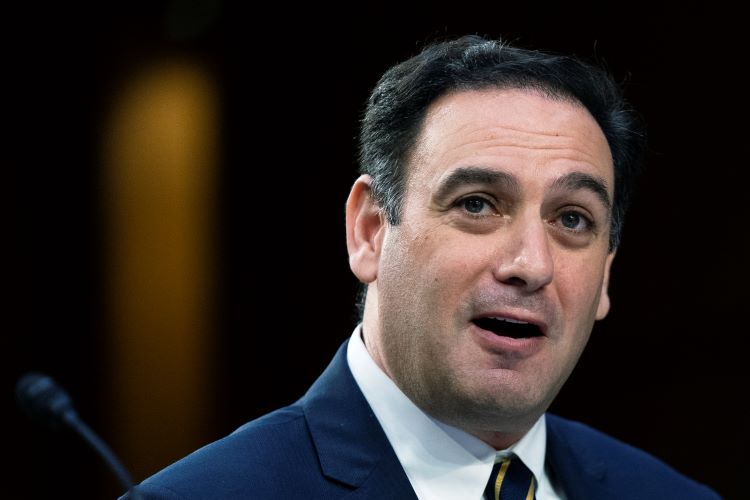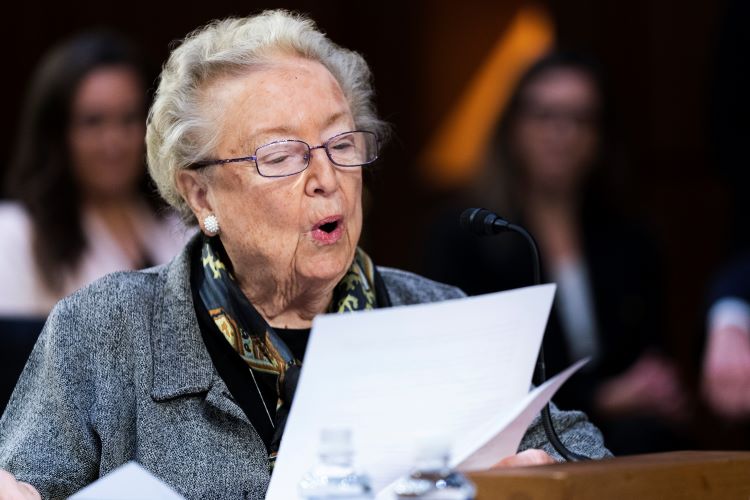Sidewalk abortion counselor, childhood friend among those weighing in on Jackson's SCOTUS nomination

Richard B. Rosenthal, a childhood friend of U.S. Supreme Court nominee Judge Ketanji Brown Jackson, testifies during a Senate Judiciary Committee confirmation hearing for Jackson on Thursday. Photos by Manuel Balce Ceneta/The Associated Press.
The Senate Judiciary Committee on Thursday heard from panelists supporting and opposing Judge Ketanji Brown Jackson’s nomination to the U.S. Supreme Court, including a childhood friend, a sidewalk abortion counselor, a law enforcement representative and Alabama's attorney general.
Testifying on Jackson’s behalf was lawyer Richard B. Rosenthal, who has known Jackson since 1984, when he was 12 and Jackson was 14. They were students at a public junior high school in Miami.
In junior and senior high, Jackson was “seemingly everywhere and anything,” Rosenthal said. She was president of the student body, the senior voted most likely to succeed and the “upbeat voice” delivering morning announcements on the public address system. She was the unofficial leader of the tight-knit family of students on the school’s debate and speech team. But no matter how high she climbed, Jackson always “threw ladders down to the rest of us,” Rosenthal said.
Read our coverage of Judge Ketanji Brown Jackson’s U.S. Supreme Court nomination hearing here.
“Through it all,” Rosenthal said, Jackson “was the one student who stood out as universally loved and admired by everyone—her fellow students, teachers and administrators alike. Ketanji’s incandescent brilliance was obvious to all of us from Day One. But even more importantly, she has always been one of the kindest, warmest, most humble and down-to-earth people I’ve ever met. All this, while still possessing boundless charisma, drive, maturity and grace.”
 Eleanor McCullen testifies during a Senate Judiciary Committee confirmation hearing on the Supreme Court nomination of Judge Ketanji Brown Jackson on Thursday.
Eleanor McCullen testifies during a Senate Judiciary Committee confirmation hearing on the Supreme Court nomination of Judge Ketanji Brown Jackson on Thursday.
Also testifying was an abortion sidewalk counselor, Eleanor McCullen, who was the lead plaintiff in a lawsuit challenging a 2007 Massachusetts law creating a 35-foot buffer zone between protesters and the entrances, exits or driveways of abortion clinics. The Supreme Court struck down the law on First Amendment grounds in the case, McCullen v. Coakley, in 2014.
Jackson was a co-author of an amicus brief while in private practice on behalf of reproductive-rights groups that supported a floating buffer zone in a different Massachusetts case, McGuire v. Reilly, in 2001.
McCullen said it was important for her to approach women outside abortion clinics to have “quiet, intimate conversations with them.” She tells the women that she will support them throughout their pregnancies and beyond and will provide them with whatever resources that they need at that moment.
McCullen said she was deeply saddened to learn that Jackson had supported a previous Massachusetts buffer zone law in the amicus brief.
“In her amicus brief, she and her colleagues maligned pro-life sidewalk counselors, characterizing us in ugly and false ways,” McCullen said.
“Her misrepresentations certainly don’t describe me or any of the sidewalk counselors that I have worked with over the years who provide support, love and options to women. Indeed, the entire reason I challenged the ‘buffer zone’ law was because I did not want to shout from a distance or come across as insensitive or compassionless to the women and families I served with love.”
McCullen said she would ask Jackson to uphold all American’s First Amendment freedoms if she is confirmed to the Supreme Court.
Other witnesses included:
• Frederick L. Thomas, national president of the National Organization of Black Law Enforcement Executives. The group endorsed Jackson, along with the the International Association of Chiefs of Police and the Fraternal Order of Police. Thomas noted that Jackson’s brother and two of her uncles were law enforcement officers.
• Alabama Attorney General Steven T. Marshall. He said he is a representative of the community of prosecutors who are concerned about law and order.
“I have heard nothing this week to alleviate my fear that Judge Jackson believes that a ‘fundamental redesign’ is needed in our criminal justice system, and that she would be inclined to use her position on the court to this end,” Marshall said.



